SUMMARY
This is AI generated summarization, which may have errors. For context, always refer to the full article.
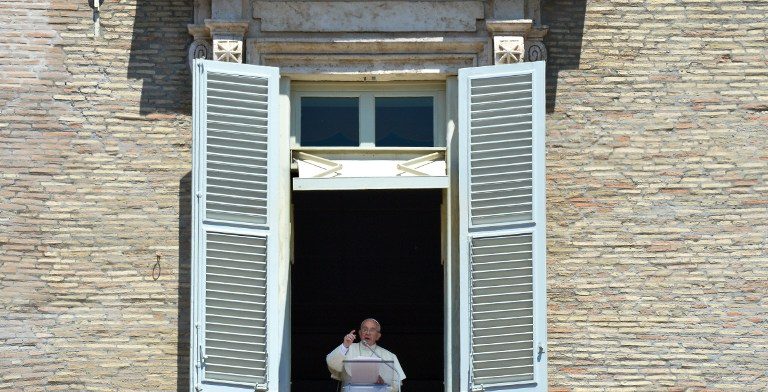
MANILA, Philippines – He is known to break Vatican protocol and go out of his way to be close to people. His biting criticism of a closed-up Church struck a chord with many Catholics – although conservatives would think otherwise.
He is the darling of global media, often the star of reports about surprising, ordinary acts that observers say is indicative of his brand of leadership.
Love him or hate him, Pope Francis seems to be a good fit for the youth who tend to favor expressing their faith through service rather than simply following the rites and traditions of the Catholic Church.
In his study, “Young People and Golden Rule Catholicism in the Philippines,” sociologist Jayeel Cornelio, who specializes in religion, said young people are pursuing what is called “golden rule Catholicism,” a principle in which right living is considered more important than right believing.
This is the kind of youth that Pope Francis will meet when he visits the Philippines. And to the youth, the Argentine pontiff represents the ideal Church leader: leading by serving, close to the masses, a People’s Pope.
Faith in action
In his interviews, Cornelio found that young people are searching for “relational authenticity” in their expression of faith, and are looking for it not in institutions, but in meaningful experiences.
“One’s faith is not simply about fulfilling sacramental duties and church doctrine,” Cornelio said. “The sources of authority for young people are no longer external – such as institutions, Scripture, or revelation – but what feels authentic to them.”
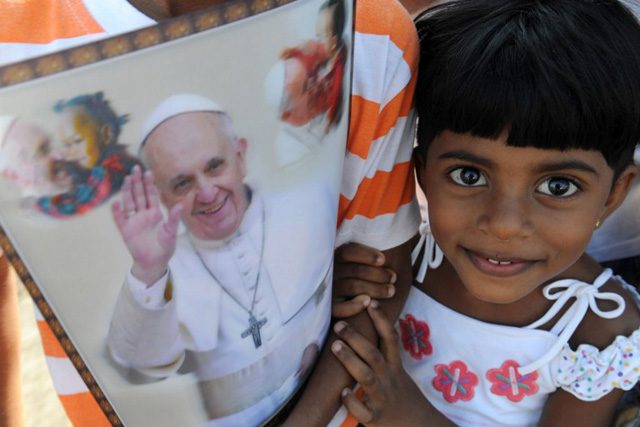
For college student Anton Onato, studying Church teachings and participating in the sacraments are still core components of what it means to be a good Catholic.
But he said that these traditions “will be in vain” if they aren’t translated into action.
“I believe more in service than in preaching. I express my religion through my actions,” he said.
The same principle guides Christian Pulmano, president of a Catholic student organization in his university. His group regularly visits urban poor communities and other marginalized sectors.
They also participate in discussions on social issues, like the controversy over the Reproductive Health (RH) law.
Pulmano believes that the Pope’s exhortations for the Church to “go to the peripheries” and serve its people resonate with today’s youth.
“The Pope showed that to serve and to show love and compassion to others, you don’t have to be powerful or influential. You just need to have the initiative. I think the youth needed to see that in their leader,” Pulmano said.
Epitome of the ideal leader
Only a few weeks into his election as the new pontiff, Francis surprised Church observers by breaking tradition in the Holy Week ritual of the washing of the feet.
Instead of performing the ritual on bishops, Francis chose to wash the feet of 12 young prisoners – two of them women, and two Muslims. He did the same thing a year later.
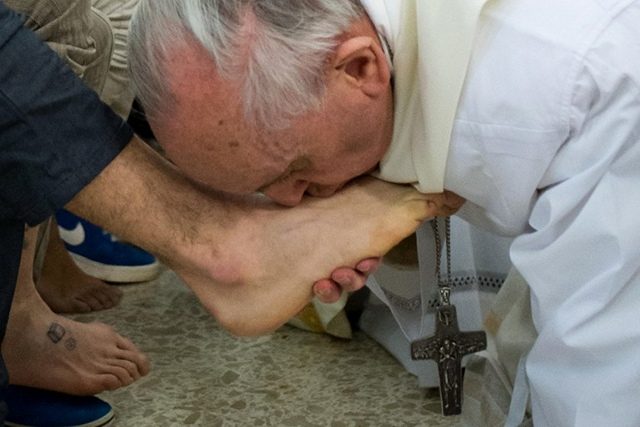
Pulmano believes that acts like these struck a chord with young people weary of reports on scandals within the Church.
A 2013 National Filipino Catholic Youth Survey said that of the estimated 30.5 million young Filipino Catholics, 84.9% consider themselves religious.
But despite this figure, only 45% have thought of joining a religious vocation. A possible cause of the disillusionment? Financial and sex scandals in the Philippine Catholic Church. (READ: Crisis in faith due to Church scandals)
Francis himself has not been afraid to criticize his own institution. Last year, in a Christmas speech to cardinals, bishops and priests, the Pope pointed out a list of ailments plaguing the Vatican and urged a cure for a Church suffering from what he calls “spiritual Alzheimer’s.”
His coming into the papacy came at a time when the Catholic Church, under fire for its scandals, needed a leader to set the course, Onato said.
“At a time when people no longer have trust in some of the Catholic priests, Pope Francis became the epitome of what a servant of God should be,” he added.
“I think Francis’ election to the papacy is a gift from above especially in this age where Holiness is very hard to achieve.”
– Anton Onato
Pulmano said he didn’t care much about the Argentine’s predecessor. Pope Benedict XVI, Pulmano said, was unrelatable.
Francis was different. To Pulmano, the new Pope reminded everyone of what the Church should stand for and what its mission should be.
It’s a message that the local clergy should take well to heart, Onato said.
Leaders who walk their talk
Both Pulmano and Onato have nothing but praises for Francis, but they are a little less enthusiastic about their local Church leaders.
The 2013 survey showed that the youth want the Church out of political issues. Pulmano admitted that he has conflicting views with Church leaders whose stance contradicts what he feels is the real social situation.
One concrete example: the RH bill, which the Church slammed as “anti-life,” despite proponents’ claims that it will seek to promote maternal health care, among other things.
“In the theological readings, they say this will merit a life of happiness and joy, but I look at the poor and see that they’re in need. There’s a battle between keeping the tradition and responding to what is needed by the times,” Pulmano said.
Onato expressed his frustration with Church leaders who deviate from their vows of celibacy, poverty and obedience, instead using their priesthood for their own gain, “as if their vocation is a profession.”
Worse, when critics point out the excesses of some Church members, Onato said erring priests would seek to “justify their misbehaviors by using the phrase, ‘Let he who has no sin cast the first stone.'”
For Onato, Pope Francis’ coming into the papacy was a welcome change to redirect the Church.
“Sa tingin ko, walang problema sa Catholic Church as an institution. Ang problema ay ‘yung leaders at ‘yung mali nilang prinsipyo at pamamalakad sa Church. Tao lang naman kasi ang mga iyan eh, (I think there is no problem with the Catholic Church as an institution. The problem is with the leaders and their wrong principles and management of the Church. But they’re only human),” he said.
He added: “That’s why I’m very thankful that Pope Francis is there, because he brings the Church close to all kinds of people. That’s what the Church should do in the first place.”
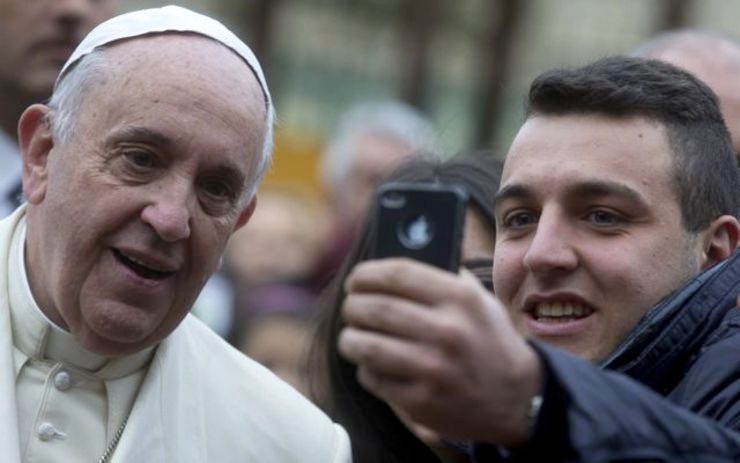
A relatable Pope
Who would have thought a time would come when it would be possible to tweet to the Pope – much less have a selfie with him? Francis is definitely media-savvy, and he wins a growing fan base by reaching out to a technologically-wired people and keeping up with the demands of a new era.
He is a pope who is acutely aware of the signs of the times and seeks to relate to it, said Daniel Angelo Lao, a former seminarian.
With the Church today confronting difficult issues such as sex scandals, corruption from within its ranks, and the thorny topic of homosexuality, the institution needs a pope capable enough to respond to the signs of the times, Lao added.
“[In Pope Francis], we find a person with whom we can relate so much, with whom we can take selfies and send tweets, with whom we can expect acceptance for unwed couples, and even single parents. These virtues are very radical and appealing to the idealist youth,” he said.
But does this make Francis progressive? Some critics point out that although the Pope breathed new life into an institution reeling from a public relations disaster, he has not exactly instituted substantial change in Church doctrine – he only made the message sweeter.
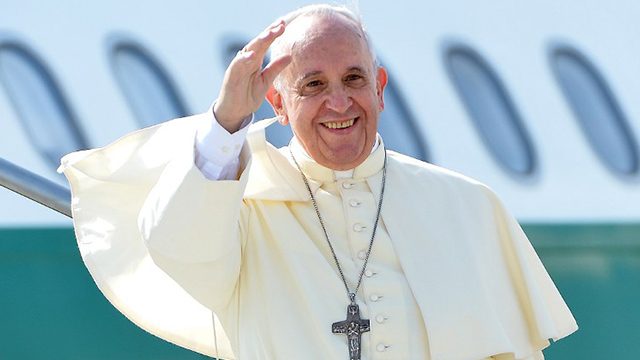
But to Onato, the Pope’s willingness to be open to change is already a welcome development.
“Our world is changing and so are our notions of what we believe is right. Pope Francis openly welcomes diversity in terms of belief and practices and I think that is something good,” he said.
Francis may not have radically changed the doctrine, but he’s changed the way the Church relates to its followers, making the secretive institution a little more demystified.
He is a public relations success story, a relatable leader, Lolo Kiko to Filipinos. Whether it’s his leadership style or the way he’s drawn the Church closer to the youth, Onato believes Francis has become a revolutionary idol for the youth.
And, Onato added, “How can you hate a Pope who is always smiling?” – Rappler.com
Add a comment
How does this make you feel?
There are no comments yet. Add your comment to start the conversation.